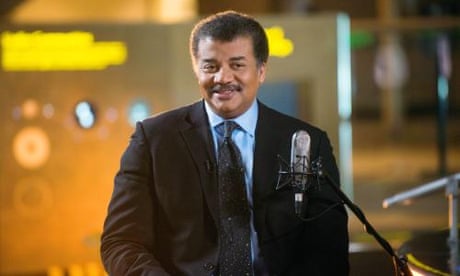Politicians cherry-picking information to suit their own agenda is one of the great tragedies of modern civilisation, the astrophysicist Neil deGrasse Tyson said on Monday night’s Q&A.
In a panel devoid of politicians, Tyson joined the oncologist and Guardian Australia columnist Ranjana Srivastava, the mathematician and CSIRO marine scientist Beth Fulton and the mathematics ambassador Adam Spencer to discuss climate change, extraterrestrial life and artificial intelligence.
In response to a question about how scientists prevent scientific ideas becoming politically partisan, Tyson said he did not have a problem with people believing in anything they wanted to. “But if that belief is not based on objective truths, you should not be creating legislation based on it,” he said.
“One of the great tragedies of modern society is that we have politicians cherry-picking science in the interests of their own social, cultural, political and religious belief systems, and that’s the beginning of the end of an informed democracy.”

Neil deGrasse Tyson: curiosity about science is 'an ember that must be fanned'
If politicians and society had strong scientific literacy, Tyson said, there should be no debate within politics as to whether climate change existed.
“If you’re trained to understand how and why science works, then the two opposite factions can have a genuine political discussion about how to react to human-induced climate change,” he said. “That’s where the debate should happen.”
Srivastava said the scepticism of some members of politics about climate science and the repercussions of climate change reminded her of the now discontinued pain relief drug Vioxx, which doctors continued to prescribe in the face of mounting evidence that it was causing strokes, heart attacks and death.
Researchers who tried to highlight these adverse reactions were badmouthed and labelled troublemakers, she said. “If someone had listened to the weight of evidence at the time instead of just saying, ‘These people are just trouble,’ I think we would have had a different outcome, especially for those families who have lost loved ones.”
Unlike Q&As of recent weeks, there was no controversy or fierce disagreement; except when it came to the topic of artificial intelligence. While Spencer worried that advances in technology meant people would be replaced by robots and rendered jobless, Tyson retorted: “That’s your weakest argument tonight.”
Jobs in new and exciting fields would be created as some professions became automated, Tyson said, creating opportunities and expanding the economy.
Spencer replied: “Suggesting people will just go and retrain, with the greatest respect, I don’t think is the strongest argument you’ve presented tonight either.”
To ensure viewers knew there was no animosity between the pair, Spencertweeted a photo of himself hugging Tyson after the show, with the caption: “All is forgiven.”
Addressing one of several questions about the existence of alien life, Tyson, who is director of the Hayden Planetarium in New York, said it was a mistake to think intelligent life would look like or interact in a similar way as humans.
“We have not successfully shared meaningful thoughts with any other species of life on earth, life with whom we have DNA in common,” he said.
“So to presume that some other species of life, which we will have no genetic identity with at all, that somehow we can have a conversation with them and have witty repartee, I think it may be our own hubris to presume that.”
He and Spencer agreed it was unlikely such life would be found within our lifetimes, but said it was possible single-cell organisms would be found on other planets.
Panellists were also asked how to get more women into science, technology, engineering and mathematics – Stem subjects – to which Fulton replied that she was lucky to work in a field, ecosystem modelling, that women had helped to shape.
“We just need to encourage more people full stop to get into science and keep it going,” she said, while Spencer and Srivastava called for more inspiring female role models in Stem subjects to be promoted to children at school.
The conversation was not restricted to science. The show began with a question about the Adam Goodes saga which has dominated news headlines for the past couple of weeks.
Srivastava said she and her colleagues had faced numerous racist putdowns during their careers, with some patients linking competency to race.
Some refused to be treated by anyone who was not white, she said, while her senior surgeon colleague wore a suit so he would not be mistaken for a security guard or cleaner.
Fulton said no matter the motivation behind it, booing and bullying was inappropriate, and multiculturalism was a strength in any society. “Diversity makes us stronger, so let’s just get past it,” she said.
http://www.theguardian.com/

No comments:
Post a Comment